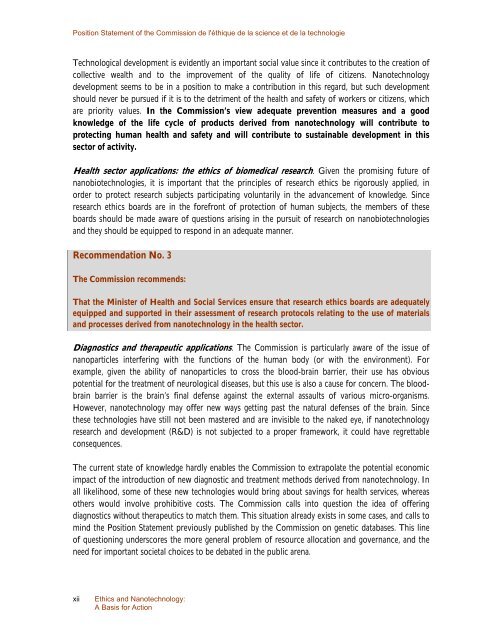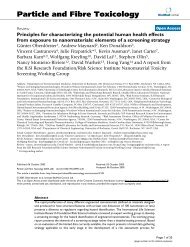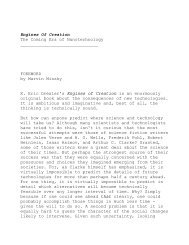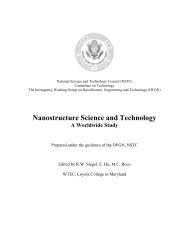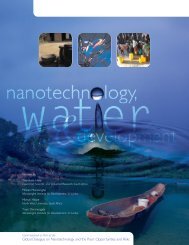A Basis for Action - Commission de l'éthique de la science et de la ...
A Basis for Action - Commission de l'éthique de la science et de la ...
A Basis for Action - Commission de l'éthique de la science et de la ...
Create successful ePaper yourself
Turn your PDF publications into a flip-book with our unique Google optimized e-Paper software.
Position Statement of the <strong>Commission</strong> <strong>de</strong> l'éthique <strong>de</strong> <strong>la</strong> <strong>science</strong> <strong>et</strong> <strong>de</strong> <strong>la</strong> technologie<br />
Technological <strong>de</strong>velopment is evi<strong>de</strong>ntly an important social value since it contributes to the creation of<br />
collective wealth and to the improvement of the quality of life of citizens. Nanotechnology<br />
<strong>de</strong>velopment seems to be in a position to make a contribution in this regard, but such <strong>de</strong>velopment<br />
should never be pursued if it is to the <strong>de</strong>triment of the health and saf<strong>et</strong>y of workers or citizens, which<br />
are priority values. In the <strong>Commission</strong>’s view a<strong>de</strong>quate prevention measures and a good<br />
knowledge of the life cycle of products <strong>de</strong>rived from nanotechnology will contribute to<br />
protecting human health and saf<strong>et</strong>y and will contribute to sustainable <strong>de</strong>velopment in this<br />
sector of activity.<br />
Health sector applications: the <strong>et</strong>hics of biomedical research. Given the promising future of<br />
nanobiotechnologies, it is important that the principles of research <strong>et</strong>hics be rigorously applied, in<br />
or<strong>de</strong>r to protect research subjects participating voluntarily in the advancement of knowledge. Since<br />
research <strong>et</strong>hics boards are in the <strong>for</strong>efront of protection of human subjects, the members of these<br />
boards should be ma<strong>de</strong> aware of questions arising in the pursuit of research on nanobiotechnologies<br />
and they should be equipped to respond in an a<strong>de</strong>quate manner.<br />
Recommendation No. 3<br />
The <strong>Commission</strong> recommends:<br />
That the Minister of Health and Social Services ensure that research <strong>et</strong>hics boards are a<strong>de</strong>quately<br />
equipped and supported in their assessment of research protocols re<strong>la</strong>ting to the use of materials<br />
and processes <strong>de</strong>rived from nanotechnology in the health sector.<br />
Diagnostics and therapeutic applications. The <strong>Commission</strong> is particu<strong>la</strong>rly aware of the issue of<br />
nanoparticles interfering with the functions of the human body (or with the environment). For<br />
example, given the ability of nanoparticles to cross the blood-brain barrier, their use has obvious<br />
potential <strong>for</strong> the treatment of neurological diseases, but this use is also a cause <strong>for</strong> concern. The bloodbrain<br />
barrier is the brain’s final <strong>de</strong>fense against the external assaults of various micro-organisms.<br />
However, nanotechnology may offer new ways g<strong>et</strong>ting past the natural <strong>de</strong>fenses of the brain. Since<br />
these technologies have still not been mastered and are invisible to the naked eye, if nanotechnology<br />
research and <strong>de</strong>velopment (R&D) is not subjected to a proper framework, it could have regr<strong>et</strong>table<br />
consequences.<br />
The current state of knowledge hardly enables the <strong>Commission</strong> to extrapo<strong>la</strong>te the potential economic<br />
impact of the introduction of new diagnostic and treatment m<strong>et</strong>hods <strong>de</strong>rived from nanotechnology. In<br />
all likelihood, some of these new technologies would bring about savings <strong>for</strong> health services, whereas<br />
others would involve prohibitive costs. The <strong>Commission</strong> calls into question the i<strong>de</strong>a of offering<br />
diagnostics without therapeutics to match them. This situation already exists in some cases, and calls to<br />
mind the Position Statement previously published by the <strong>Commission</strong> on gen<strong>et</strong>ic databases. This line<br />
of questioning un<strong>de</strong>rscores the more general problem of resource allocation and governance, and the<br />
need <strong>for</strong> important soci<strong>et</strong>al choices to be <strong>de</strong>bated in the public arena.<br />
xii<br />
Ethics and Nanotechnology:<br />
A <strong>Basis</strong> <strong>for</strong> <strong>Action</strong>


